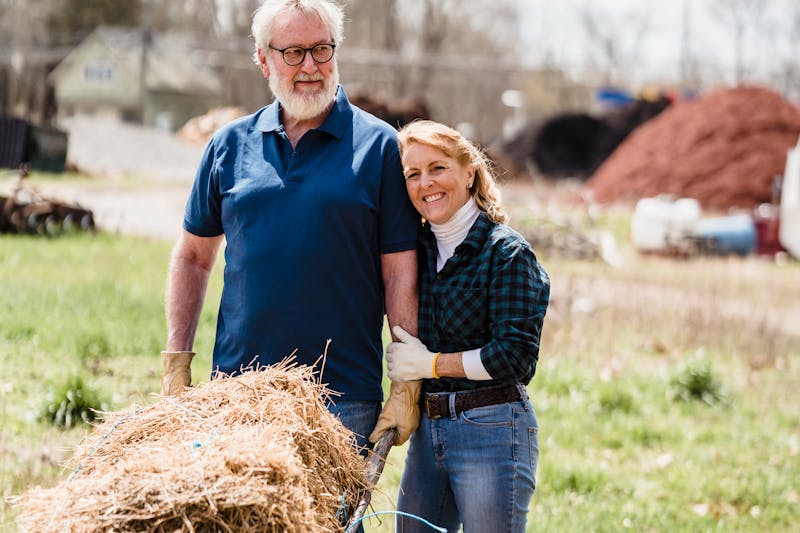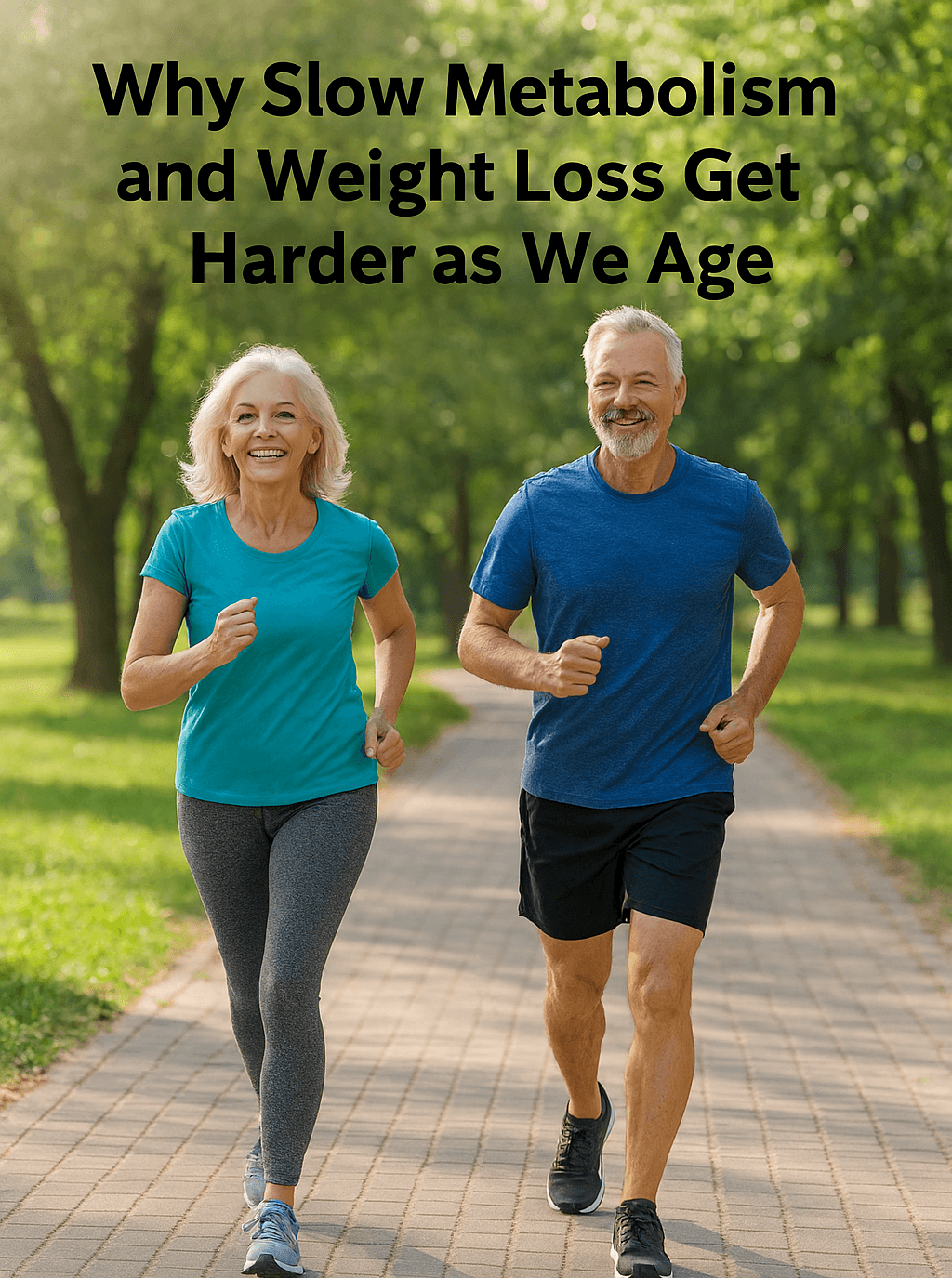Last Updated on December 6, 2025 by shawnshealth
Slow metabolism and weight loss challenges increase with age. Improve results through strength training, balanced diet, and quality sleep.
Why Slow Metabolism and Weight Loss Gets Harder as We Age: Unlock Proven Solutions
As we get older, we often notice changes in our bodies. One of the most frustrating changes is the struggle to lose weight, even with the same diet and exercise routine that once worked. The reality is that metabolism naturally slows down with age, contributing to slow metabolism and weight loss challenges, but that’s not the only factor contributing to weight gain. In this post, we will dive deep into why slow metabolism and weight loss get harder as we age and share proven solutions to help you overcome these challenges.
🧠 Want to know the exact minimalist formula I use to build strength without a gym? Read the full guide for simple, proven steps. 🏋️♂️ Then explore our Bodyweight Strength guide to unlock real-world power using just your body—perfect for van life, recovery, or aging well.

Authors Note:
One of these days, I’ll write a book called Easy Weight Loss—though let’s be honest, for most people, it’s anything but easy. I’ve never heard anyone say, “Dropping 50 pounds was easier than sitting on the couch eating ice cream.” Add age and a slowing metabolism, and it gets even tougher.
Still, while weight loss isn’t easy, it is doable—especially if you take smart, manageable steps. One example I like to use: diet soda. Is it ideal? No. But if it helps you skip a 600-calorie milkshake, it might just be the better option. People undergo risky surgery to lose weight—so let’s not act like diet soda is the villain.
So, take it one step at a time. Old or young, fast metabolism or slow—you can make it happen. Build better habits and carry them forward. Not easy, but worth it. So do it.
💪 Maximize your workouts with gear that boosts strength, comfort, and consistency. Explore our top-rated essentials for safe, effective training—perfect for home, van life, or recovery.
⚠️ As an Amazon Associate, I earn from qualifying purchases.
Why Is Weight Loss Harder With a Slow Metabolism?
- Aging naturally slows your metabolism, making it harder to burn calories.
- Muscle mass decreases with age, lowering your resting metabolic rate.
- Hormonal changes impact how your body stores fat and uses energy.
- Energy levels and recovery time decline, reducing workout intensity.
How to Lose Weight With a Slow Metabolism
- Prioritize strength training to preserve and build muscle.
- Eat a high-protein, balanced diet to support metabolism.
- Stay hydrated and limit sugary drinks.
- Get consistent, quality sleep to regulate appetite and hormones.
- Include low-calorie swaps like diet soda if they help reduce overall intake.
Best Habits for Long-Term Weight Loss With a Slow Metabolism
- Build daily movement into your routine—walking, stretching, light workouts.
- Focus on habit stacking: pair new healthy habits with existing ones.
- Reduce stress to minimize cortisol-related weight gain.
- Avoid extreme diets—choose sustainable changes instead.
- Track progress, not perfection—consistency wins.
➡️ Want the complete breakdown? Read our Ultimate Weight Loss & Fat Loss Guide.
Table of Contents

Understanding the Problem: Slow Metabolism and Age-Related Weight Gain
Metabolism refers to the processes in the body that convert food into energy. A slow metabolism means these processes happen less efficiently, leading to fewer calories burned throughout the day. As you age, several factors contribute to this slowdown:
In understanding slow metabolism and weight loss, it’s important to note that lifestyle adjustments can significantly influence both.
Slow metabolism and weight loss are interconnected, as a slow metabolism leads to fewer calories burned and more difficulty losing weight.
1. Decreased Muscle Mass
As we age, we naturally lose muscle mass, a condition known as sarcopenia. Muscle is more metabolically active than fat, meaning it burns more calories even at rest. With less muscle mass, fewer calories are burned, making weight loss more challenging.
Understanding slow metabolism and weight loss is crucial in managing your weight effectively as you age. Recognizing the signs of slow metabolism and weight loss issues can empower you to take action.
2. Hormonal Changes
Hormones play a significant role in regulating metabolism, appetite, and fat storage. As we age, there’s a decrease in hormones like testosterone, estrogen, and growth hormone, all of which help regulate metabolic rate. In particular, a drop in estrogen can increase fat storage around the abdominal area, which is especially noticeable during and after menopause in women.
3. Reduced Physical Activity
Older adults tend to be less active, and a sedentary lifestyle only exacerbates weight gain. Lack of exercise, particularly strength training, accelerates muscle loss and further decreases metabolic rate.
4. Lifestyle Factors
Addressing slow metabolism and weight loss requires a comprehensive approach that combines nutrition, exercise, and mental health.
Implementing strategies to manage slow metabolism and weight loss can lead to long-term success.
The key to overcoming slow metabolism and weight loss challenges lies in making informed choices about your diet.
To mitigate the effects of slow metabolism and weight loss, consistency in your diet and exercise is key.
Stress, lack of sleep, and poor nutrition are other lifestyle factors that can interfere with weight loss. Sleep deprivation can negatively affect appetite-regulating hormones, while chronic stress increases cortisol levels, which may contribute to fat storage.

Solutions for Weight Loss in Older Adults: Nutrition, Exercise, and Mental Well-being
While these factors may seem daunting, there are several practical and effective solutions for overcoming the hurdles of slow metabolism and weight loss. Let’s explore nutrition, physical activity, and mental well-being strategies that can support your goals.
1. Nutrition: Eating to Support Your Metabolism
Diet plays a crucial role in boosting metabolism and managing weight, especially as you age. Here are some nutrition strategies to keep your metabolism revved up:
- Focus on Protein
As muscle mass naturally declines, it’s important to consume enough protein to maintain what muscle you have. Protein also has a higher thermic effect (calories burned during digestion) compared to fats and carbohydrates, making it a great metabolism booster. Aim for protein-rich foods like lean meats, fish, eggs, legumes, and plant-based proteins.

Incorporating movement into your daily routine can combat slow metabolism and weight loss issues effectively.
- Eat Smaller, More Frequent Meals
Instead of large, infrequent meals, try eating smaller meals throughout the day. This can help keep your metabolism active and maintain a stable blood sugar level, which prevents cravings and overeating. - Incorporate Metabolism-Boosting Foods
Certain foods can help give your metabolism a boost, including:- Green tea: Known for its metabolism-enhancing properties.
- Spicy foods: Chili peppers contain capsaicin, which can slightly raise metabolism.
- Whole grains: High in fiber, which helps control appetite and supports digestion.
- Avoid Sugar and Refined Carbs
Sugary and refined carbohydrates can cause blood sugar spikes and crashes, leading to increased fat storage. Instead, focus on complex carbs like whole grains, vegetables, and fruits that provide sustained energy.
🔥 Want to fire up your metabolism naturally? This WebMD guide breaks down the top foods that help boost energy, curb cravings, and support healthy weight loss
2. Physical Exercise: Moving to Boost Your Metabolism
Exercise is one of the most effective ways to combat slow metabolism and weight gain as we age. Here’s how to focus your exercise routine to combat age-related metabolism changes:
- Strength Training
Strength training is critical for maintaining and building muscle mass. Incorporating weightlifting or bodyweight exercises (such as squats, lunges, and push-ups) helps keep your muscles strong and supports a healthy metabolism.
Maintaining mental well-being is essential in the journey to address slow metabolism and weight loss effectively.

- Cardio Exercise
Cardiovascular exercises such as walking, swimming, or cycling help burn calories and improve cardiovascular health. Aim for at least 150 minutes of moderate-intensity cardio per week. - High-Intensity Interval Training (HIIT)
HIIT is an efficient exercise strategy where short bursts of intense exercise are followed by a brief rest. This type of workout can help you burn more fat in less time, even after your workout ends. - Stay Active Throughout the Day
If traditional exercise isn’t your thing, try to stay active throughout the day. Take the stairs, go for short walks, or try an activity like gardening to keep your metabolism active.
🏃♂️ See the official Physical Activity Guidelines from ODPHP—clear targets for staying active at any age.
3. Mental Well-being: Staying Positive and Stress-Free
Mental health and stress levels have a direct impact on metabolism and weight loss. Stress can increase cortisol levels, which encourages fat storage, particularly in the abdominal area. Additionally, negative mental health can lead to overeating or emotional eating.
- Practice Stress-Reduction Techniques
Try activities like meditation, yoga, or deep breathing exercises to manage stress. Regularly practicing mindfulness can help you stay calm, focused, and reduce emotional eating triggers. - Prioritize Sleep
Lack of sleep negatively affects hunger hormones like ghrelin (which increases appetite) and leptin (which signals fullness). Aim for 7-9 hours of quality sleep to help regulate appetite and metabolism. - Cultivate a Positive Mindset
Staying motivated can be difficult when the scale doesn’t reflect your efforts. Practice positive affirmations and set realistic goals to keep your morale high. Celebrate small victories and be kind to yourself throughout the process.
🧠 Discover how exercise reduces stress and the psychology behind lasting weight loss—because mindset matters as much as movement.
Conclusion: Embrace a Balanced Approach for Sustainable Weight Loss
As we age, losing weight becomes more challenging, but it’s not impossible. By focusing on nutrition, exercise, and mental well-being, you can boost your metabolism and tackle the obstacles that come with aging. Slow metabolism is just one factor among many, and with the right strategies, you can maintain a healthy weight and improve your overall well-being.
Understanding the effects of slow metabolism and weight loss on your body is the first step towards effective management.
By adopting a holistic approach to slow metabolism and weight loss, you can achieve a sustainable lifestyle change.

🔥 Gear to Help You Achieve Your Health and Fitness Goals 💪
If you’re looking for tools to enhance your fitness journey, check out this. Explore top-rated fitness gear on Amazon to enhance your workouts. Check out the latest picks here! 🛒 to support your workouts and progress.
🚀 Find equipment designed to boost strength, endurance, and overall performance!
⚠️ Short disclaimer: As an Amazon Associate, I earn from qualifying purchases.
FAQ: Slow Metabolism and Weight Loss
1. What causes a slow metabolism?
Aging, muscle loss, hormonal shifts, and low activity levels can slow metabolism.
2. Can you speed up a slow metabolism?
Yes—strength training, more protein, better sleep, and staying active can help.
3. Does a slow metabolism prevent weight loss?
It makes it harder, but not impossible. Sustainable habits can still lead to results.
4. How do hormones affect metabolism?
Hormones like thyroid, insulin, and cortisol impact how your body burns energy.
5. Are diet foods bad for weight loss?
Not necessarily. They can be a helpful low-calorie alternative for some people.
6. Why does weight loss get harder with age?
You lose muscle, your metabolism slows, and recovery takes longer.
7. Should I do cardio or strength training?
Strength training is better for boosting metabolism; cardio supports heart health.
8. What’s the best diet for a slow metabolism?
High-protein, nutrient-dense foods with fewer processed carbs work best.
I will instruct you and teach you in the way you should go; I will counsel you with my eye upon you. – Psalm 32:8




